Interview with Laurie Marshall

Second acts. Invitations for rediscovery. So many of us find new passions, or develop older ones, later in life. How wonderful when we take the opportunity to explore the things that speak to our hearts. Enter Laurie Marshall–a woman who, just two years ago started submitting her writing to literary journals, and in her late 50s is publishing her first book! I had the great pleasure of speaking with Laurie, whose enthusiasm and optimism are truly inspiring–and contagious!
Diane: Welcome, Laurie. One of the great perks of doing interviews is that I get to read advanced copies of books! I’m so glad to have read your new flash fiction collection Proof of Life, which is now available for preorder through ELJ Editions.
You told me earlier that you were a big proponent of second acts. Is writing a second act for you?
Laurie: It is! I never really had a career path in mind in my twenties, I just had jobs to pay the bills. For several years when my daughters were small, I worked on the campus of the University of Arkansas and took classes as often as I could in the evenings. After a divorce, I enrolled full-time to complete a degree in English because a degree would allow me to get a job that paid more. After graduation, and several years in nonprofit communications, I realized I’d always been writing as part of my work, I just didn’t know that it was a thing I could do “for real”. I hadn’t considered being a Writer, capital “W”. It’s exciting to be at this stage now, but I do look back and think, gosh, I wish I had known this was possible in my thirties!
“A Lot of My Writing Comes from Experiences I’ve Had and Challenges I’ve Gone Through”
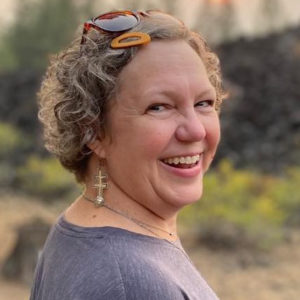 Diane: I hear you. I got my MFA at 58. That’s when I really started taking writing seriously, but I think I couldn’t have done it sooner. I think I needed the wisdom and the life experience.
Diane: I hear you. I got my MFA at 58. That’s when I really started taking writing seriously, but I think I couldn’t have done it sooner. I think I needed the wisdom and the life experience.
Laurie: I totally agree. I know a lot of my writing comes from experiences I’ve had and challenges I’ve gone through. And I don’t worry about perfection or appeasing people’s opinions anymore. I definitely feel a lot freer now to just write whatever I feel like writing and assume there will be an audience for it somewhere. I’ve applied for a creative writing MFA program and will be 61 when I graduate (if I am accepted). It’s a commitment, but time is short!
Diane: That’s amazing. It was really one of the best decisions in my life. Good luck!
What was it like for you when you first started submitting?
Laurie: I admit I have a pretty healthy self-image. Maybe it comes with the territory as an optimist. My first year of submitting work seriously was 2021, and I sent out 155 pieces of flash and micro fiction and creative nonfiction. Some of it was terrible, but I was taking virtual workshops throughout that year (one of the only good things to come of the covid pandemic) and I can see as I read those early pieces vs. what I sent later in the year that I was getting better. I got my first acceptance of that year in January, from Janus Literary, and that gave me the confidence to keep putting things out there. I’ve had 28 things published since I began submitting in late 2020.
Diane: That’s great.
“I Just Choose Not to Be Too Worried about the Rejections”
Laurie: I also don’t get myself all torn up about being rejected. There are SO many journals out there, and SO many writers submitting, it just follows that not everyone is right for every outlet. I could have just sent it to the wrong place, or the person who was the first reader didn’t connect with it. So you send it somewhere else and hopefully it goes there. I just choose not to be too worried about the rejections.
Diane: I love that you said, “I choose not to be,” because it really is a choice. Getting so many acceptances means that your writing is strong, of course, but also that you’re pretty prolific and submit a lot. Putting yourself out there like that over and over and over takes courage.
If One Door Shuts, a Window Opens, So I Just Crawl Through the Window”
 Laurie: Is it courage? Hmmm. Maybe. What is the alternative? Quitting? Rejection is just part of the process. I think you can get hung up and feeling bad about it, or you can just move on. I’ve always been a person that, as the saying goes, if one door shuts, a window opens, and so I just crawl through the window. It’s how I’ve lived my whole life.
Laurie: Is it courage? Hmmm. Maybe. What is the alternative? Quitting? Rejection is just part of the process. I think you can get hung up and feeling bad about it, or you can just move on. I’ve always been a person that, as the saying goes, if one door shuts, a window opens, and so I just crawl through the window. It’s how I’ve lived my whole life.
Diane: I’ve never heard that expression with windows opening—just doors.
I love that.
Laurie: I’m probably saying it wrong. The window sounds more subversive.
Diane: I love the window!
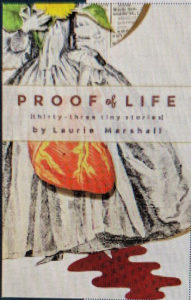 Let’s talk about Proof of Life. There are a few things that really stuck out for me in your stories. First, you have great characters.
Let’s talk about Proof of Life. There are a few things that really stuck out for me in your stories. First, you have great characters.
Laurie: Thank you.
Diane: They’re very spunky, feisty. Sometimes it feels like they puff themselves up a bit, like they’re not totally convinced, and while they try on the confidence, it doesn’t exactly fit. They’re also pretty self-aware—until they’re asked to change, which is such a very human way of being. Some of your characters do change and some of them, not yet.
How do characters come to you, or are they based on people you know?
Laurie: As you were describing them, I thought to myself, “well, I’m obviously just writing about myself.” Clearly, these are all me. *laughs* As I said earlier, I do have fairly high self esteem – I puff myself up a little bit, and I don’t like to be told I have to change myself. I think it’s pretty safe to say that a lot of writers create characters who are extensions of ourselves. Our multiple personas show up because we’re all of these characters all wrapped up in one ridiculous person trying on different selves in our work.
“I Did Take a Plant to a Guy Who Helped Me Get a Mortgage When I Was Getting Divorced”
When Ariana Den Bleyker, my editor and publisher at ELJ Editions, told me some of the things she liked about this collection, something she mentioned was how characters are either running away from something or running towards something, which I had not thought about as I wrote, but it’s so true.
I do love creating characters and watching them figure out their stuff in my stories.
Diane: Big shout out to Ariana! Love her!!
I noticed that place plays a huge role in your stories—Texas and the beach. Are you from Texas?
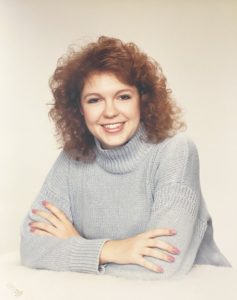 Laurie: I’m from northwest Arkansas, but I lived in Texas during some very formative years – in high school and in my early 20s.
Laurie: I’m from northwest Arkansas, but I lived in Texas during some very formative years – in high school and in my early 20s.
A lot of my stories could probably be called autofiction. For example, there’s one about a woman who takes a plant to a loan officer as a thank you for helping her qualify for a mortgage. The whole story of it didn’t happen, but I did take a plant to a guy who helped me get a mortgage when I was getting divorced.
I also think it’s important, especially in flash fiction, to place readers immediately in the location the story is happening. In “Sitting in Brandy’s 1974 Firebird” the narrator mentions the boy from Brinkley. Brinkley’s a little town in the Arkansas Delta, and while all readers won’t know that, specifically, I like to think my stories can be found on a map, even if it’s only a map in the reader’s imagination.
Diane: “Being on a map” grounds the reader. It works wonderfully.
Laurie: Thank you.
Diane: You’re also funny. Even though there’s a lot of death in your stories—mother death, father death, breaking apart of marriages and families—you add humor. I wouldn’t call this a heavy collection at all.
“I’m Not a Sad, Melancholy Person. At. All. I’m Even in a Comedy Improv Group!”
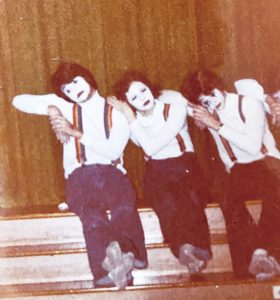 Laurie: I’m so thrilled to hear that! When I was sending pieces to my siblings in 2020 and 2021 for their feedback, my sister said, “Why are all of your stories so sad?” It’s curious to me, as it was to her, because I am not a sad, melancholy person. At. All. I’m even in a comedy improv group! But there’s so much loss and yearning and regret in some of my stories, all I can think is that I’m like a colorful candy shell on the outside and then inside is all the dark chocolate and bitter cocoa nibs. That’s got to be it.
Laurie: I’m so thrilled to hear that! When I was sending pieces to my siblings in 2020 and 2021 for their feedback, my sister said, “Why are all of your stories so sad?” It’s curious to me, as it was to her, because I am not a sad, melancholy person. At. All. I’m even in a comedy improv group! But there’s so much loss and yearning and regret in some of my stories, all I can think is that I’m like a colorful candy shell on the outside and then inside is all the dark chocolate and bitter cocoa nibs. That’s got to be it.
Diane: But it’s delicious.
Laurie: Thank you.
Diane: And fun. You have threads of dark humor running through a lot of stories.
Take “Marvin the Lesser.”
He goes to therapists but keeps switching as soon as they ask him to make changes because “there was still more that could be done. But Marvin didn’t want more. Marvin wanted less.”
Laurie: There are several characters in these stories that I want to sit down and visit with again. Maybe write something longer or write more stories from that character’s point of view.
Like, who is Marvin? Why does he keep going to therapy when they keep telling him stuff he doesn’t want to hear? What is that about?
Diane: The sister in “The Sea, the Sea, the Stupid Fucking Sea” is not the ideal sibling. How did your sister like that one?
“I Do Love to Write Titles, and I Feel for the Writers Who Struggle with Them”
Laurie: Oh, yeah. That’s a terrible sister!
I have two brothers and a sister, and I don’t think any of them have made it into my stories. My sister is my best friend, so that story is definitely not about her. My late mother shows up in different ways, though. Probably a lot of the loss I write is related to my feelings around her death.
I’m also working on a collection that will be a memoir-in-flash about the years after my parents’ divorce, so my brothers might show up there, tangentially. Speaking of, I’m really enjoying Body Work by Melissa Febos and her thoughts on writing about real people.
Diane: Another thing I love about your stories is your titles.
“After Harry Signed the Lease Before He Was One Year Sober” is one I love. “Some of Us Say We Are Worried About Larry.” I love that one. Do you have a favorite title?
Laurie: Thanks, gosh, it’s hard to choose. I think one of the most successful is “In Lieu of Flowers”, because it sets the scene immediately as a funeral or funeral-related. I also love “Is Transparent a Color or Does it Mean Invisible?” because it speaks to the way middle age and grief both seem to render us invisible to the rest of the world, and even to ourselves in some ways.
I do love to write titles, and I feel for the writers who struggle with them. I like to use a title to put the reader in the place or situation and then launch into the action, so I don’t have to worry about setting the scene with “this person’s at a funeral,” or “this person’s mother’s dying.”
“Maybe If I Can Watch Them Work Through It, I’ll Figure Out How to Do the Same Thing in Real Life”
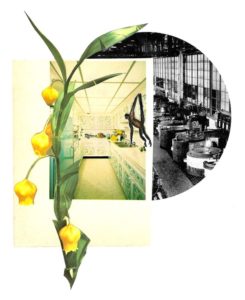 You can put all of that in the title, and then go from there in the story. They can add so much subtext and backstory. Maybe it’s like a screenplay scene heading, where the setup is “INTERIOR, NIGHT, FRANK AND MARGARET ARE SITTING SIDE-BY-SIDE AT THE BAR, BUT LOOKING IN OPPOSITE DIRECTIONS.” And, ACTION!
You can put all of that in the title, and then go from there in the story. They can add so much subtext and backstory. Maybe it’s like a screenplay scene heading, where the setup is “INTERIOR, NIGHT, FRANK AND MARGARET ARE SITTING SIDE-BY-SIDE AT THE BAR, BUT LOOKING IN OPPOSITE DIRECTIONS.” And, ACTION!
Diane: Whenever I sit down to write, often the same themes come. Even though I don’t plan to write about those themes, there they are again. I feel like we have two or three themes that are just so important in our lives and we’re working them through, and probably will always be. Do you find that as well?
Laurie: There are some themes–loss, yearning, hope– that show up in my work, whether I’m writing a piece of fiction or nonfiction. I think for many of my characters, there’s a lot of thinking that things could have been different “if only,” and what if we could change this one thing? I guess I’m intrigued by characters who are dealing with something difficult. Maybe if I can watch them work through it, I’ll figure out how to do the same thing in real life. It definitely feels personal.
Diane: Your characters are resilient. Even if they don’t make the choices that are necessarily “the best for them,” they’ll get another chance most of the time (unless they’re hit by a truck while they’re in their yard fixing something like in “Mrs. Breedlow Needs the Number for a Reliable Handyman”).
Laurie: Yes, unless that happens. Spoilers!
“I Definitely Fly by the Seat of My Pants in Life and in Writing”
My characters come by their “resilience” naturally. I’m a libra, so I’m naturally indecisive. For example, I was trying to become an actress in Dallas in my early twenties, and even spent money to have headshots made, and then I decided on a whim to join the Army instead. Who does that?? The Army would give me $20,000 to go to school, and now I know I did that to put off my fear of failing at the thing I really wanted. Then I got married, got pregnant, lost my $20,000 when I took a hardship discharge, blah blah blah, and got the degree when I was 41. I definitely fly by the seat of my pants in life and in writing. As George Eliot said: “It’s never too late to be what you might have been.”
Diane: Thanks for sharing images of several of your collages with us. I’d love it if you’d tell us little bit about your artwork.
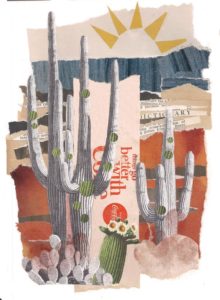 Laurie: I am a collage artist, another thing I’ve gotten serious about over the last couple of years. My mother was very artistic and encouraged her kids to explore creativity in any form. Band, theater, art, choir, we all tried most art forms at some point or another. And we all still practice at least one or two as adults.
Laurie: I am a collage artist, another thing I’ve gotten serious about over the last couple of years. My mother was very artistic and encouraged her kids to explore creativity in any form. Band, theater, art, choir, we all tried most art forms at some point or another. And we all still practice at least one or two as adults.
I started playing with collage several years ago because I love paper ephemera – old magazines and ticket stubs and things like that and had amassed a stash of materials and needed to figure out what to do with it. If I get stuck writing, I can pull out my sketch book and make art. I’ve enjoyed illustrating other writers’ work in journals like Flash Frog and Fictive Dream. When the collection came together I wanted to design my own cover and Ariana agreed. There are a few collages inside the book as well.
Diane: You do book covers for other people too, right?
Laurie: I have, yes. A couple of them have been created using collage and some are more traditional graphic design. Jared Beloff and I are collaborating on a couple of projects as well. I’m illustrating some of his beautiful poems about the natural world, and we’re working toward putting a chapbook together, which I’m really excited about. We just had one piece published in Beaver Magazine, and a couple more will be in Psaltery & Lyre over the next few months.
Diane: That’s wonderful. I love second acts too—and so great to hear about yours! Best of luck with the book and all your upcoming projects!
As always, I’d love to hear from you. Please write a comment or send me an email.
See you soon!
XOXOXO
Diane




Thanks, Diane, for another awesome interview and introduction to another amazing woman. When someone says: “Is it courage? Hmmm. Maybe. What is the alternative? Quitting?” you know they are an inspiring person but that they have no idea why. My favorite 🙂
And I LOVE the chapter titles!!
Thanks, Sherry! A favorite type of inspiration for me too! And YES to those titles!!
I love hearing about successful second acts! I enjoyed the interview and will be ordering her collection.
I love hearing about second acts too, Sarah! Thanks so much and you will love the collection!!
Thank you so much Sarah! I hope you find some stories that resonate with you. 🙂
This puts in mind what the uncle says in The Faberman’s–which my husband and I are in the middle of watching. It is something like: being an artist will make your life, and it will break your heart.
Laurie, you give us creatives (or creative wannabes) HEART! Congratulations!
Oh Greta! That’s so wonderful! (And btw, dear Greta, you already had heart!)
XO
I’m so pleased to hear this! Or, read it, I suppose… 🙂
Fantastic interview!! I’m so thrilled Proof of Life will soon be out in the world.
Thanks so much, Talya! You will LOVE it!
You’re an inspiration, friend!! 😘
Such a great interview! I *love* Laurie’s titles.
Thank you, Alison! I love her titles too!!!
Thank you Alison!